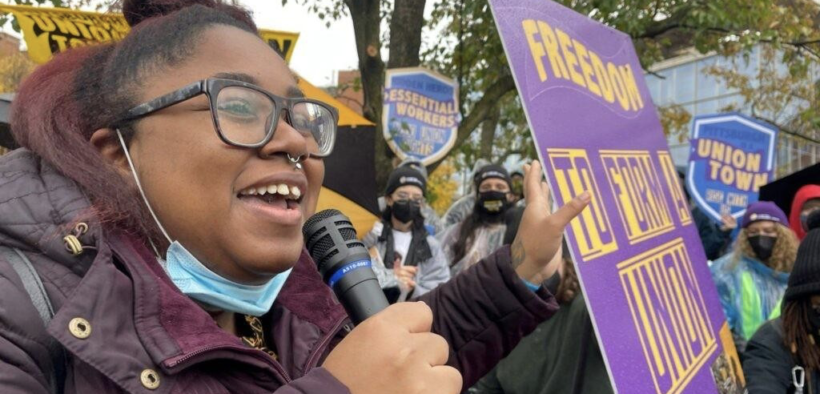Zarah Livingston, Candidate for Pennsylvania House, on Her Experiences Campaigning and Her Expectations for the Green Party
Share

On October 14, Queonia “Zarah” Livingston, a contender for District 32 of the Pennsylvania House of Representatives, tweeted, “Reminder: I’m always open for questions & concerns about myself, my platform &, etc.” So, over a Zoom call from her home in Penn Hills,
Livingston spoke to Green Pages about the background, challenges, and promise of her campaign.
Livingston, a certified nursing assistant, helped organize racial justice protests in 2020 and participated in strike actions at her workplace, UPMC Mercy. UPMC Mercy is the main hospital facility of the University of Pittsburgh Medical Center and is located in the Uptown section of the city of Pittsburgh, Pennsylvania. Although politically active, earlier in her history, she was indifferent to party politics.
“Originally, I signed up as a Democrat ‘cause that’s – my family votes both ways depending on the candidate, but that’s what most of my family picked to be registered,” she said. “I was young and didn’t really know what to pick.”
When she began to scrutinize the party, she felt alienated.
“I was leaning more out of the Democratic Party the more I researched and the more people I didn’t personally align with as far as thought process goes . . . it all stems from
researching more on what I personally have core beliefs in.”
Livingston’s state representative, Anthony DeLuca, accrued a record that did not live up to her values. DeLuca did adopt progressive positions, advocating same-day voter registration and opposing a bill discriminating against transgender female athletes, for two examples.
However, he also supported petrochemical companies in the form of massive tax breaks. And he favored more stringent regulations around community-led bail funds.
Livingston has claimed ground in this election as an alternative to DeLuca’s more moderate politics. As her website shows, she endorses clean energy and specifically wants to end fracking. Additionally, past coverage of her campaign has cited her opposition to DeLuca’s vote on bail funds. And in response to one initiative where DeLuca acted friendlier to the left – raising the minimum wage to $ 15 per hour – Livingston has moved further, championing $20 per hour, according to her site.
Livingston began her candidacy with no party affiliation. She eventually reached out to the Green Party of Allegheny County, her local chapter, for their backing, and camaraderie developed.
“I knew about them from doing all the protests . . . and from there, because I realized I knew some people from it as well, we got to talk more and more.”
The local Greens had the infrastructure in place and offered Livingston needed services so she could secure her spot on the ballot.
With no party, “there was not really a community-cohesive situation. If you needed information about what petitions you needed, how many signatures, I had no idea,” she stated. With the Greens, “it’s nice having people who obviously are going to know more than I do.”
Their combined efforts have ensured District 32 voters will see her name. No Republican filed, leaving Livingston only to face DeLuca.
The race took an unexpected turn on October 9 due to DeLuca’s death from cancer. But his unfortunate passing does not mean that Livingston wins by default. Votes for DeLuca are still valid and if he receives more on November 8, a special election will occur at a later date. As a contest between a minor party movement and a Democratic majority that a respected legislator’s name represents on the ballot, stakes still exist for Livingston.
Winning the trust of enough voters in a district that numbers over 64,000 people demands heavy activity. Livingston explained how her campaign has evolved.
The fundraising haul has been small. She said she is “approaching $2,000” and acknowledged that she has donated extra money that she earned from overtime at her job.
As for volunteers, she does not know an exact number but speculated that she has seen “close to 100” by this point. More important than the precise figure is this detail: “I definitely had a lot of people, they were like, ‘Oh yes, if you want to run, I’ll help you. Do whatever you need. Just let me know.’”
Physical campaigning has extended to tabling at public events, such as farmers’ markets, connecting her with voters, including those outside the party. Convincing them to stay with the Greens after the election is another hurdle. Livingston has noticed some intrigue among voters she has spoken to.
“I know people who are definitely interested or . . . people who have stuck to Democrat to vote in the primaries are like, ‘No, I’ll vote for Green Party.’”
To increase the party’s votes and membership, though, candidates will surely have to answer to the common accusation of playing the “spoiler,” which says that in the event a Democrat loses, the votes that went to the Green would have gone to the Democrat if the former did not run.
This charge cannot apply to Livingston’s race, yet it may pop up in postmortems on the high-profile U.S. Senate battle between John Fetterman and Mehmet Oz, depending on the outcome. If Fetterman loses, all eyes will shoot to the vote totals for Richard Weiss.
Livingston does not worry about the effect that campaign could have on potential allies, prioritizing policy differences in her decision-making. She supports Weiss over Fetterman because of Fetterman’s inconsistent stance on fracking.
“If you’re going to be progressive, be progressive all the way,” she suggested.
Livingston did share concerns about the Green Party’s future, specifically over whether it can retain new members.
Drawing on her experience in organizing, she argued, “People come in cycles of liking things, kind of like how media cycles go. So if it’s exciting and there are things happening, people will stick around. But I feel if you’re in your stages where maybe there’s not a lot going on and . . . a little bit of a break so people don’t burn out, unless you keep them engaged somehow, they lose interest.”
Summing up her lack of optimism, she added, “There’s only so much engaging you can do before you’re burnt out.”
While Livingston views the line between engagement and exhaustion as delicate, and her concerns should command Green organizers’ attention, a series of meet-and-greets that she plans to hold through election day stands for an opportunity to publicize the dangers of fracking, to promote a less punitive justice system and finally to provoke listeners to question the two-party system.
If the Greens are to be the main electoral organization that calls out all of these issues, their growth at any rate remains urgent. Livingston’s campaign is not only useful, but it is also necessary.






Note: This article was written and submitted prior to the November 8, 2022, general election.